Supply Chain Management - Machine Learning
VerifiedAdded on 2022/09/14
|17
|3713
|17
AI Summary
Contribute Materials
Your contribution can guide someone’s learning journey. Share your
documents today.

Supply chain management
9 / 1 4 / 2 0 1 9
9 / 1 4 / 2 0 1 9
Secure Best Marks with AI Grader
Need help grading? Try our AI Grader for instant feedback on your assignments.
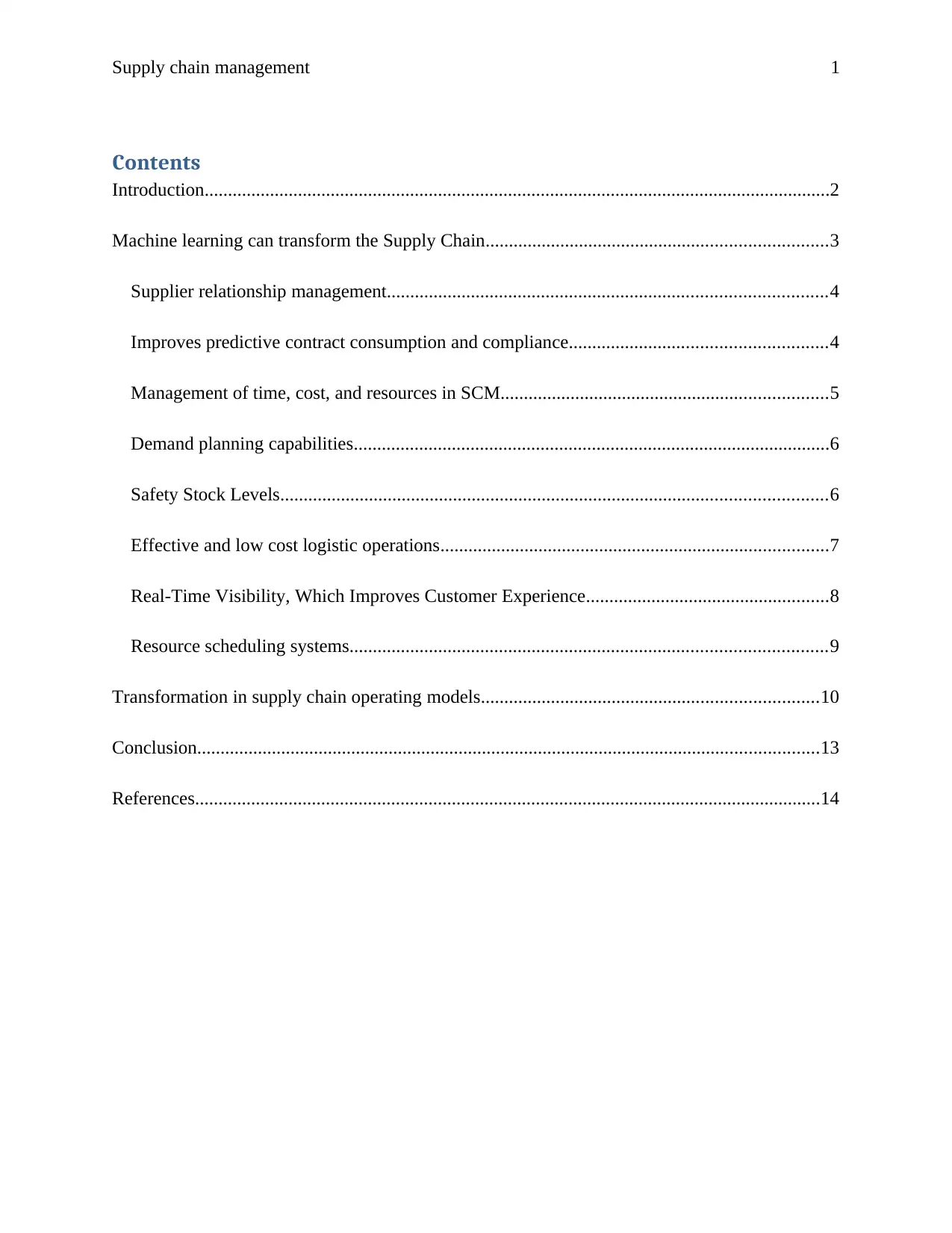
Supply chain management 1
Contents
Introduction......................................................................................................................................2
Machine learning can transform the Supply Chain.........................................................................3
Supplier relationship management..............................................................................................4
Improves predictive contract consumption and compliance.......................................................4
Management of time, cost, and resources in SCM......................................................................5
Demand planning capabilities......................................................................................................6
Safety Stock Levels.....................................................................................................................6
Effective and low cost logistic operations...................................................................................7
Real-Time Visibility, Which Improves Customer Experience....................................................8
Resource scheduling systems......................................................................................................9
Transformation in supply chain operating models........................................................................10
Conclusion.....................................................................................................................................13
References......................................................................................................................................14
Contents
Introduction......................................................................................................................................2
Machine learning can transform the Supply Chain.........................................................................3
Supplier relationship management..............................................................................................4
Improves predictive contract consumption and compliance.......................................................4
Management of time, cost, and resources in SCM......................................................................5
Demand planning capabilities......................................................................................................6
Safety Stock Levels.....................................................................................................................6
Effective and low cost logistic operations...................................................................................7
Real-Time Visibility, Which Improves Customer Experience....................................................8
Resource scheduling systems......................................................................................................9
Transformation in supply chain operating models........................................................................10
Conclusion.....................................................................................................................................13
References......................................................................................................................................14
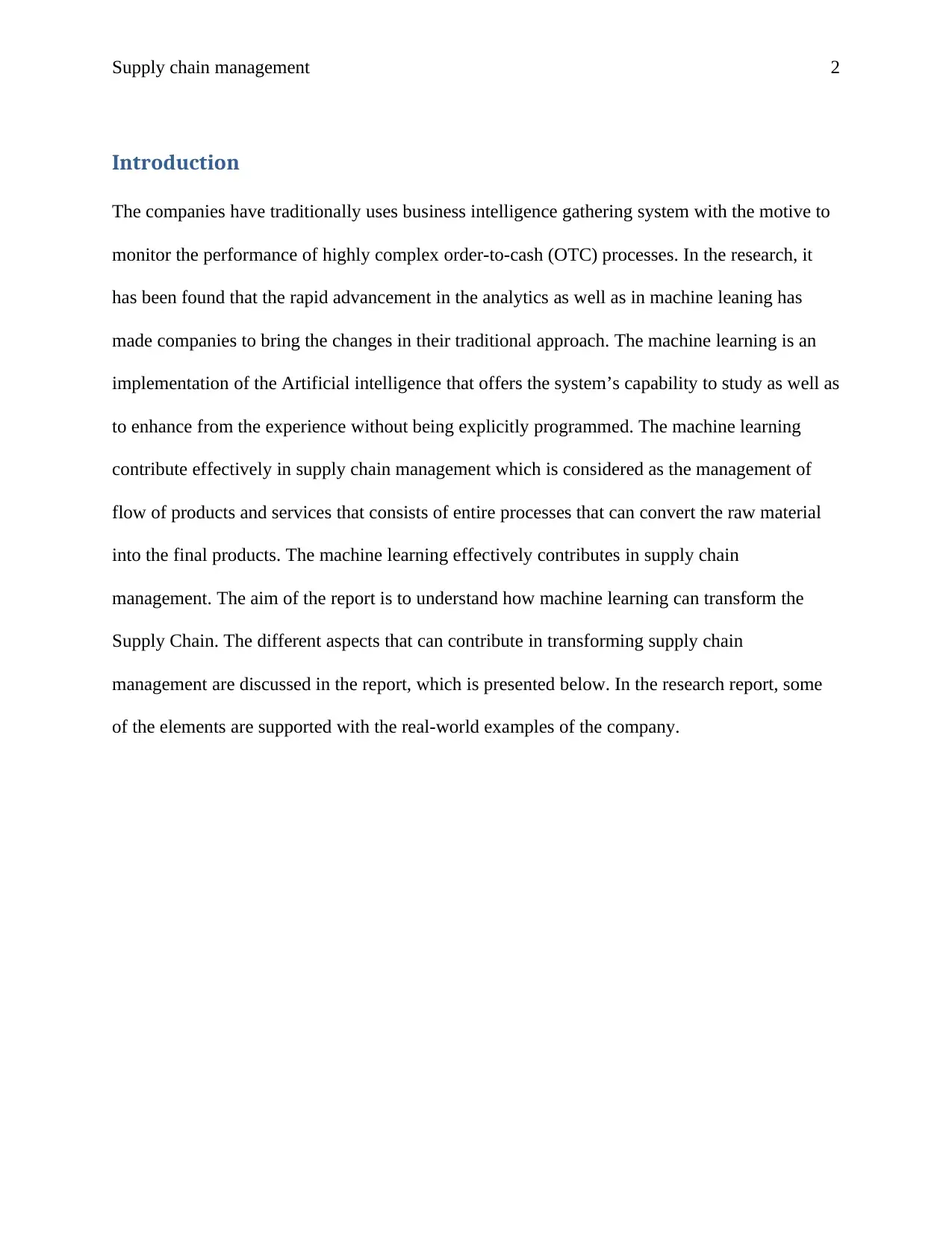
Supply chain management 2
Introduction
The companies have traditionally uses business intelligence gathering system with the motive to
monitor the performance of highly complex order-to-cash (OTC) processes. In the research, it
has been found that the rapid advancement in the analytics as well as in machine leaning has
made companies to bring the changes in their traditional approach. The machine learning is an
implementation of the Artificial intelligence that offers the system’s capability to study as well as
to enhance from the experience without being explicitly programmed. The machine learning
contribute effectively in supply chain management which is considered as the management of
flow of products and services that consists of entire processes that can convert the raw material
into the final products. The machine learning effectively contributes in supply chain
management. The aim of the report is to understand how machine learning can transform the
Supply Chain. The different aspects that can contribute in transforming supply chain
management are discussed in the report, which is presented below. In the research report, some
of the elements are supported with the real-world examples of the company.
Introduction
The companies have traditionally uses business intelligence gathering system with the motive to
monitor the performance of highly complex order-to-cash (OTC) processes. In the research, it
has been found that the rapid advancement in the analytics as well as in machine leaning has
made companies to bring the changes in their traditional approach. The machine learning is an
implementation of the Artificial intelligence that offers the system’s capability to study as well as
to enhance from the experience without being explicitly programmed. The machine learning
contribute effectively in supply chain management which is considered as the management of
flow of products and services that consists of entire processes that can convert the raw material
into the final products. The machine learning effectively contributes in supply chain
management. The aim of the report is to understand how machine learning can transform the
Supply Chain. The different aspects that can contribute in transforming supply chain
management are discussed in the report, which is presented below. In the research report, some
of the elements are supported with the real-world examples of the company.
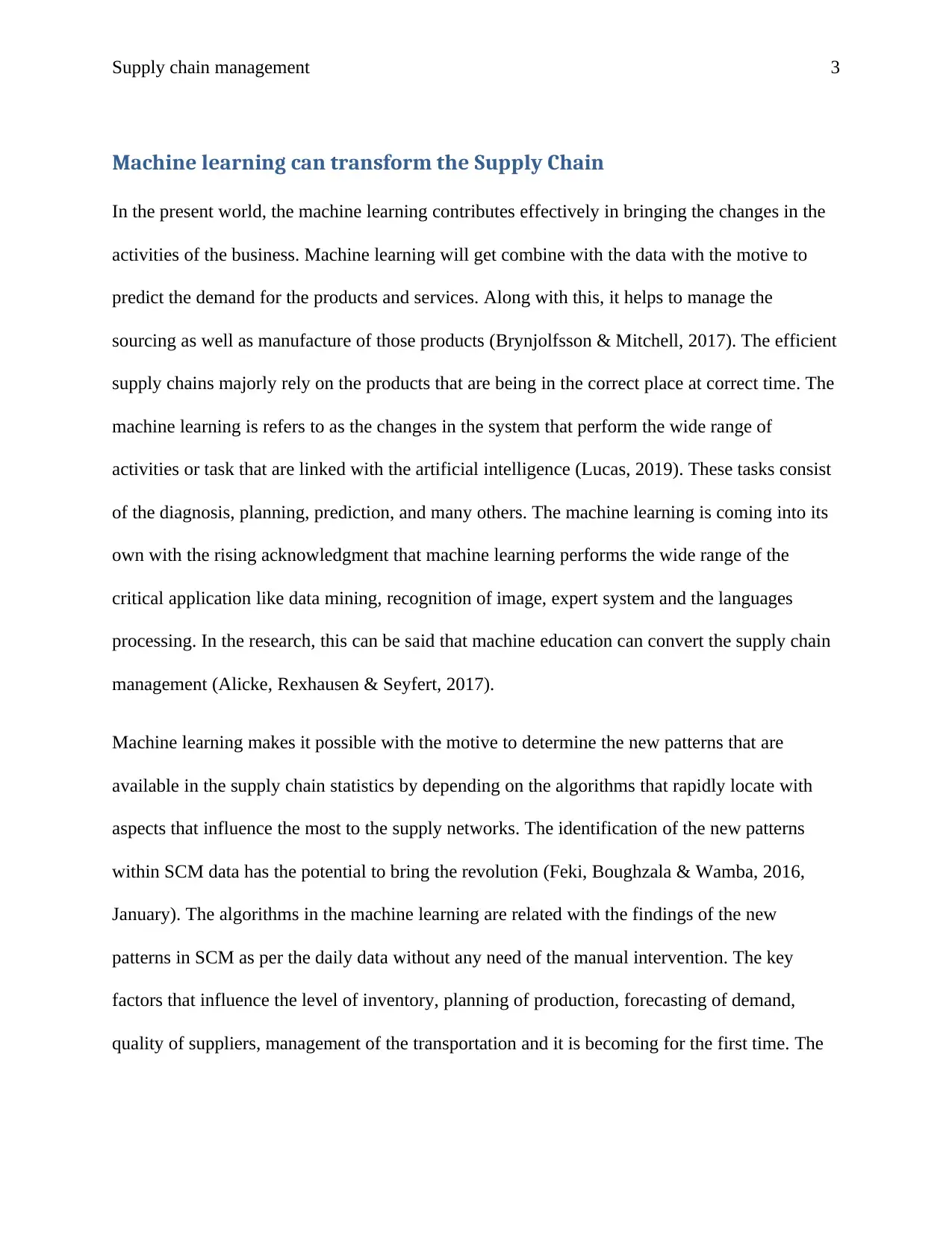
Supply chain management 3
Machine learning can transform the Supply Chain
In the present world, the machine learning contributes effectively in bringing the changes in the
activities of the business. Machine learning will get combine with the data with the motive to
predict the demand for the products and services. Along with this, it helps to manage the
sourcing as well as manufacture of those products (Brynjolfsson & Mitchell, 2017). The efficient
supply chains majorly rely on the products that are being in the correct place at correct time. The
machine learning is refers to as the changes in the system that perform the wide range of
activities or task that are linked with the artificial intelligence (Lucas, 2019). These tasks consist
of the diagnosis, planning, prediction, and many others. The machine learning is coming into its
own with the rising acknowledgment that machine learning performs the wide range of the
critical application like data mining, recognition of image, expert system and the languages
processing. In the research, this can be said that machine education can convert the supply chain
management (Alicke, Rexhausen & Seyfert, 2017).
Machine learning makes it possible with the motive to determine the new patterns that are
available in the supply chain statistics by depending on the algorithms that rapidly locate with
aspects that influence the most to the supply networks. The identification of the new patterns
within SCM data has the potential to bring the revolution (Feki, Boughzala & Wamba, 2016,
January). The algorithms in the machine learning are related with the findings of the new
patterns in SCM as per the daily data without any need of the manual intervention. The key
factors that influence the level of inventory, planning of production, forecasting of demand,
quality of suppliers, management of the transportation and it is becoming for the first time. The
Machine learning can transform the Supply Chain
In the present world, the machine learning contributes effectively in bringing the changes in the
activities of the business. Machine learning will get combine with the data with the motive to
predict the demand for the products and services. Along with this, it helps to manage the
sourcing as well as manufacture of those products (Brynjolfsson & Mitchell, 2017). The efficient
supply chains majorly rely on the products that are being in the correct place at correct time. The
machine learning is refers to as the changes in the system that perform the wide range of
activities or task that are linked with the artificial intelligence (Lucas, 2019). These tasks consist
of the diagnosis, planning, prediction, and many others. The machine learning is coming into its
own with the rising acknowledgment that machine learning performs the wide range of the
critical application like data mining, recognition of image, expert system and the languages
processing. In the research, this can be said that machine education can convert the supply chain
management (Alicke, Rexhausen & Seyfert, 2017).
Machine learning makes it possible with the motive to determine the new patterns that are
available in the supply chain statistics by depending on the algorithms that rapidly locate with
aspects that influence the most to the supply networks. The identification of the new patterns
within SCM data has the potential to bring the revolution (Feki, Boughzala & Wamba, 2016,
January). The algorithms in the machine learning are related with the findings of the new
patterns in SCM as per the daily data without any need of the manual intervention. The key
factors that influence the level of inventory, planning of production, forecasting of demand,
quality of suppliers, management of the transportation and it is becoming for the first time. The
Secure Best Marks with AI Grader
Need help grading? Try our AI Grader for instant feedback on your assignments.
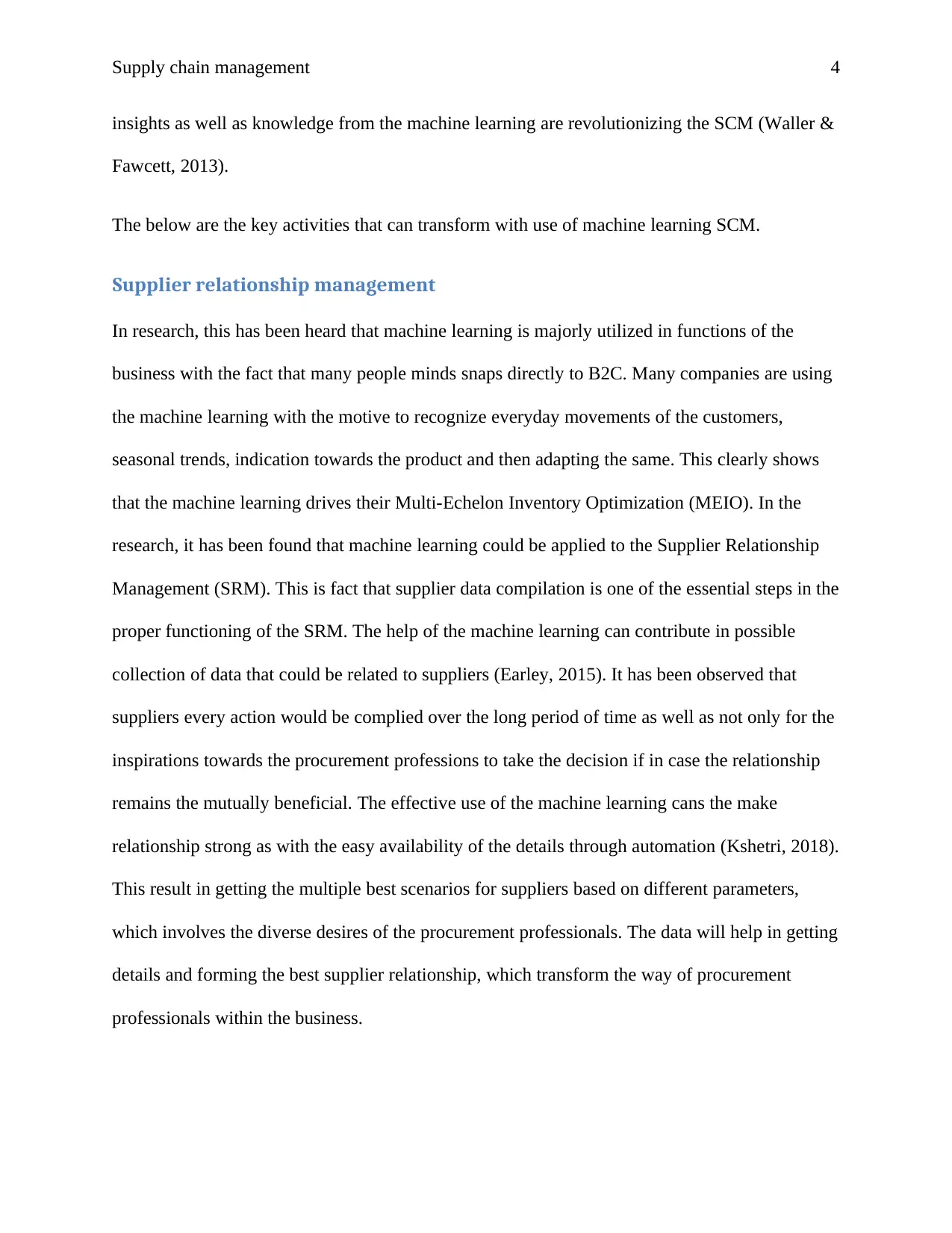
Supply chain management 4
insights as well as knowledge from the machine learning are revolutionizing the SCM (Waller &
Fawcett, 2013).
The below are the key activities that can transform with use of machine learning SCM.
Supplier relationship management
In research, this has been heard that machine learning is majorly utilized in functions of the
business with the fact that many people minds snaps directly to B2C. Many companies are using
the machine learning with the motive to recognize everyday movements of the customers,
seasonal trends, indication towards the product and then adapting the same. This clearly shows
that the machine learning drives their Multi-Echelon Inventory Optimization (MEIO). In the
research, it has been found that machine learning could be applied to the Supplier Relationship
Management (SRM). This is fact that supplier data compilation is one of the essential steps in the
proper functioning of the SRM. The help of the machine learning can contribute in possible
collection of data that could be related to suppliers (Earley, 2015). It has been observed that
suppliers every action would be complied over the long period of time as well as not only for the
inspirations towards the procurement professions to take the decision if in case the relationship
remains the mutually beneficial. The effective use of the machine learning cans the make
relationship strong as with the easy availability of the details through automation (Kshetri, 2018).
This result in getting the multiple best scenarios for suppliers based on different parameters,
which involves the diverse desires of the procurement professionals. The data will help in getting
details and forming the best supplier relationship, which transform the way of procurement
professionals within the business.
insights as well as knowledge from the machine learning are revolutionizing the SCM (Waller &
Fawcett, 2013).
The below are the key activities that can transform with use of machine learning SCM.
Supplier relationship management
In research, this has been heard that machine learning is majorly utilized in functions of the
business with the fact that many people minds snaps directly to B2C. Many companies are using
the machine learning with the motive to recognize everyday movements of the customers,
seasonal trends, indication towards the product and then adapting the same. This clearly shows
that the machine learning drives their Multi-Echelon Inventory Optimization (MEIO). In the
research, it has been found that machine learning could be applied to the Supplier Relationship
Management (SRM). This is fact that supplier data compilation is one of the essential steps in the
proper functioning of the SRM. The help of the machine learning can contribute in possible
collection of data that could be related to suppliers (Earley, 2015). It has been observed that
suppliers every action would be complied over the long period of time as well as not only for the
inspirations towards the procurement professions to take the decision if in case the relationship
remains the mutually beneficial. The effective use of the machine learning cans the make
relationship strong as with the easy availability of the details through automation (Kshetri, 2018).
This result in getting the multiple best scenarios for suppliers based on different parameters,
which involves the diverse desires of the procurement professionals. The data will help in getting
details and forming the best supplier relationship, which transform the way of procurement
professionals within the business.
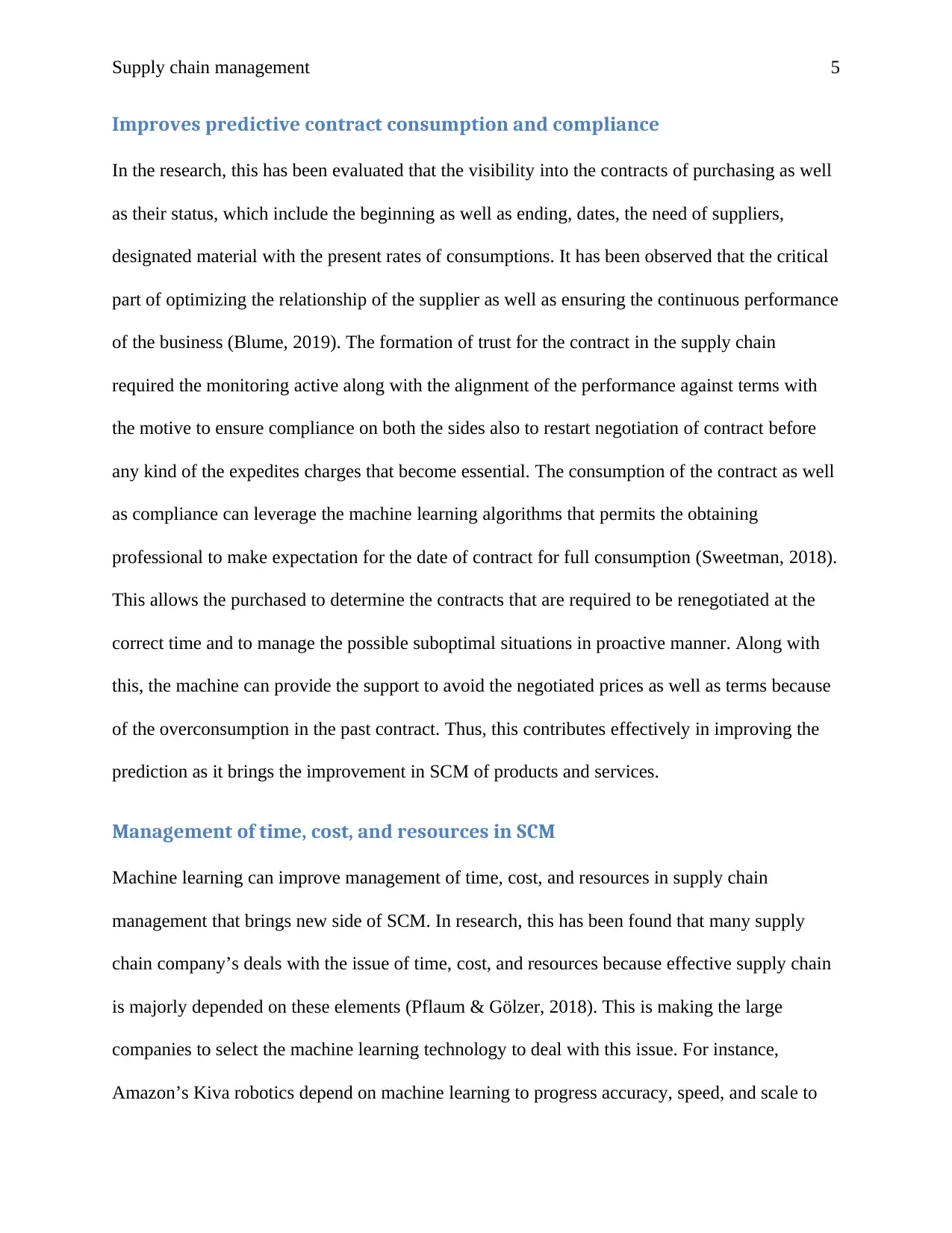
Supply chain management 5
Improves predictive contract consumption and compliance
In the research, this has been evaluated that the visibility into the contracts of purchasing as well
as their status, which include the beginning as well as ending, dates, the need of suppliers,
designated material with the present rates of consumptions. It has been observed that the critical
part of optimizing the relationship of the supplier as well as ensuring the continuous performance
of the business (Blume, 2019). The formation of trust for the contract in the supply chain
required the monitoring active along with the alignment of the performance against terms with
the motive to ensure compliance on both the sides also to restart negotiation of contract before
any kind of the expedites charges that become essential. The consumption of the contract as well
as compliance can leverage the machine learning algorithms that permits the obtaining
professional to make expectation for the date of contract for full consumption (Sweetman, 2018).
This allows the purchased to determine the contracts that are required to be renegotiated at the
correct time and to manage the possible suboptimal situations in proactive manner. Along with
this, the machine can provide the support to avoid the negotiated prices as well as terms because
of the overconsumption in the past contract. Thus, this contributes effectively in improving the
prediction as it brings the improvement in SCM of products and services.
Management of time, cost, and resources in SCM
Machine learning can improve management of time, cost, and resources in supply chain
management that brings new side of SCM. In research, this has been found that many supply
chain company’s deals with the issue of time, cost, and resources because effective supply chain
is majorly depended on these elements (Pflaum & Gölzer, 2018). This is making the large
companies to select the machine learning technology to deal with this issue. For instance,
Amazon’s Kiva robotics depend on machine learning to progress accuracy, speed, and scale to
Improves predictive contract consumption and compliance
In the research, this has been evaluated that the visibility into the contracts of purchasing as well
as their status, which include the beginning as well as ending, dates, the need of suppliers,
designated material with the present rates of consumptions. It has been observed that the critical
part of optimizing the relationship of the supplier as well as ensuring the continuous performance
of the business (Blume, 2019). The formation of trust for the contract in the supply chain
required the monitoring active along with the alignment of the performance against terms with
the motive to ensure compliance on both the sides also to restart negotiation of contract before
any kind of the expedites charges that become essential. The consumption of the contract as well
as compliance can leverage the machine learning algorithms that permits the obtaining
professional to make expectation for the date of contract for full consumption (Sweetman, 2018).
This allows the purchased to determine the contracts that are required to be renegotiated at the
correct time and to manage the possible suboptimal situations in proactive manner. Along with
this, the machine can provide the support to avoid the negotiated prices as well as terms because
of the overconsumption in the past contract. Thus, this contributes effectively in improving the
prediction as it brings the improvement in SCM of products and services.
Management of time, cost, and resources in SCM
Machine learning can improve management of time, cost, and resources in supply chain
management that brings new side of SCM. In research, this has been found that many supply
chain company’s deals with the issue of time, cost, and resources because effective supply chain
is majorly depended on these elements (Pflaum & Gölzer, 2018). This is making the large
companies to select the machine learning technology to deal with this issue. For instance,
Amazon’s Kiva robotics depend on machine learning to progress accuracy, speed, and scale to
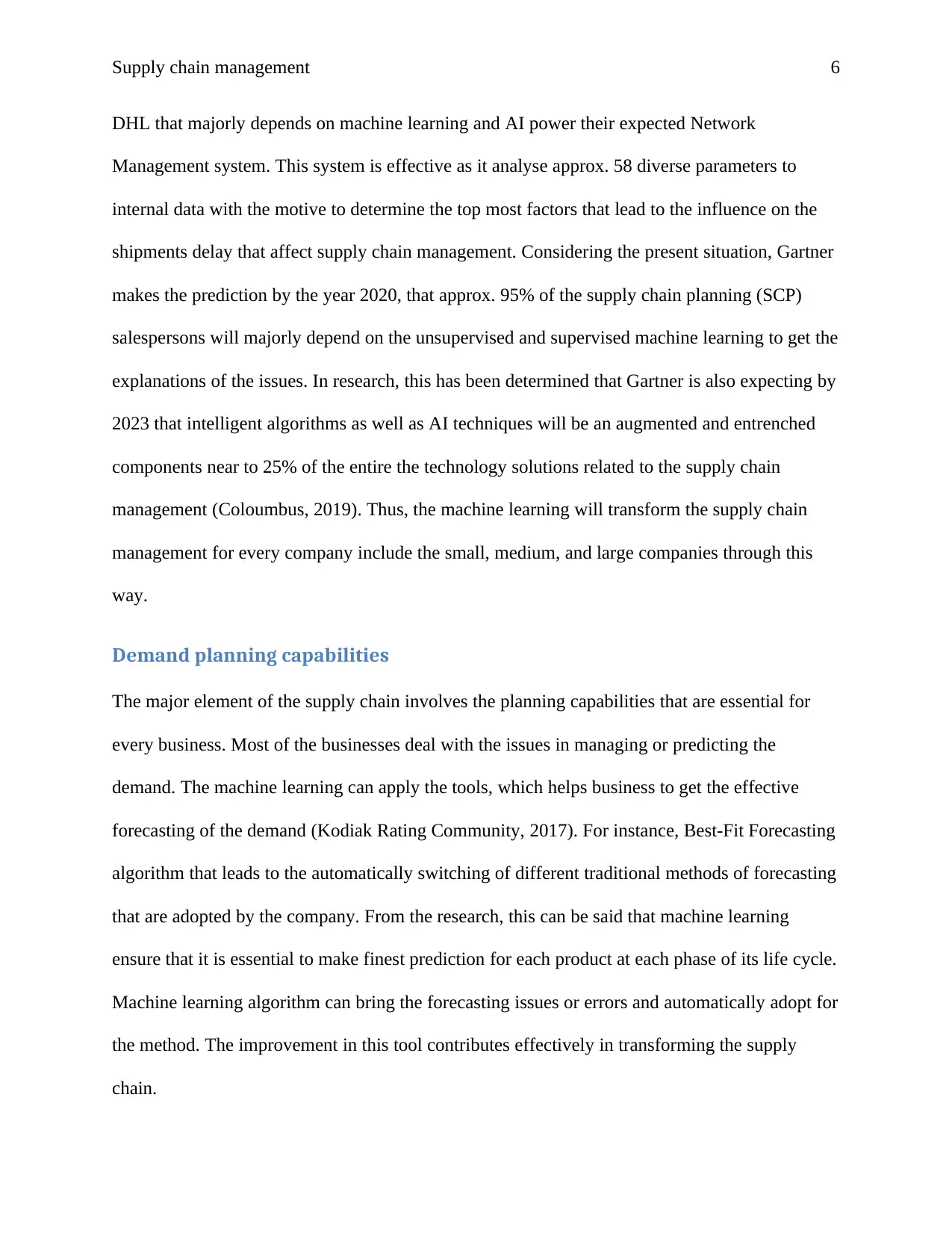
Supply chain management 6
DHL that majorly depends on machine learning and AI power their expected Network
Management system. This system is effective as it analyse approx. 58 diverse parameters to
internal data with the motive to determine the top most factors that lead to the influence on the
shipments delay that affect supply chain management. Considering the present situation, Gartner
makes the prediction by the year 2020, that approx. 95% of the supply chain planning (SCP)
salespersons will majorly depend on the unsupervised and supervised machine learning to get the
explanations of the issues. In research, this has been determined that Gartner is also expecting by
2023 that intelligent algorithms as well as AI techniques will be an augmented and entrenched
components near to 25% of the entire the technology solutions related to the supply chain
management (Coloumbus, 2019). Thus, the machine learning will transform the supply chain
management for every company include the small, medium, and large companies through this
way.
Demand planning capabilities
The major element of the supply chain involves the planning capabilities that are essential for
every business. Most of the businesses deal with the issues in managing or predicting the
demand. The machine learning can apply the tools, which helps business to get the effective
forecasting of the demand (Kodiak Rating Community, 2017). For instance, Best-Fit Forecasting
algorithm that leads to the automatically switching of different traditional methods of forecasting
that are adopted by the company. From the research, this can be said that machine learning
ensure that it is essential to make finest prediction for each product at each phase of its life cycle.
Machine learning algorithm can bring the forecasting issues or errors and automatically adopt for
the method. The improvement in this tool contributes effectively in transforming the supply
chain.
DHL that majorly depends on machine learning and AI power their expected Network
Management system. This system is effective as it analyse approx. 58 diverse parameters to
internal data with the motive to determine the top most factors that lead to the influence on the
shipments delay that affect supply chain management. Considering the present situation, Gartner
makes the prediction by the year 2020, that approx. 95% of the supply chain planning (SCP)
salespersons will majorly depend on the unsupervised and supervised machine learning to get the
explanations of the issues. In research, this has been determined that Gartner is also expecting by
2023 that intelligent algorithms as well as AI techniques will be an augmented and entrenched
components near to 25% of the entire the technology solutions related to the supply chain
management (Coloumbus, 2019). Thus, the machine learning will transform the supply chain
management for every company include the small, medium, and large companies through this
way.
Demand planning capabilities
The major element of the supply chain involves the planning capabilities that are essential for
every business. Most of the businesses deal with the issues in managing or predicting the
demand. The machine learning can apply the tools, which helps business to get the effective
forecasting of the demand (Kodiak Rating Community, 2017). For instance, Best-Fit Forecasting
algorithm that leads to the automatically switching of different traditional methods of forecasting
that are adopted by the company. From the research, this can be said that machine learning
ensure that it is essential to make finest prediction for each product at each phase of its life cycle.
Machine learning algorithm can bring the forecasting issues or errors and automatically adopt for
the method. The improvement in this tool contributes effectively in transforming the supply
chain.
Paraphrase This Document
Need a fresh take? Get an instant paraphrase of this document with our AI Paraphraser
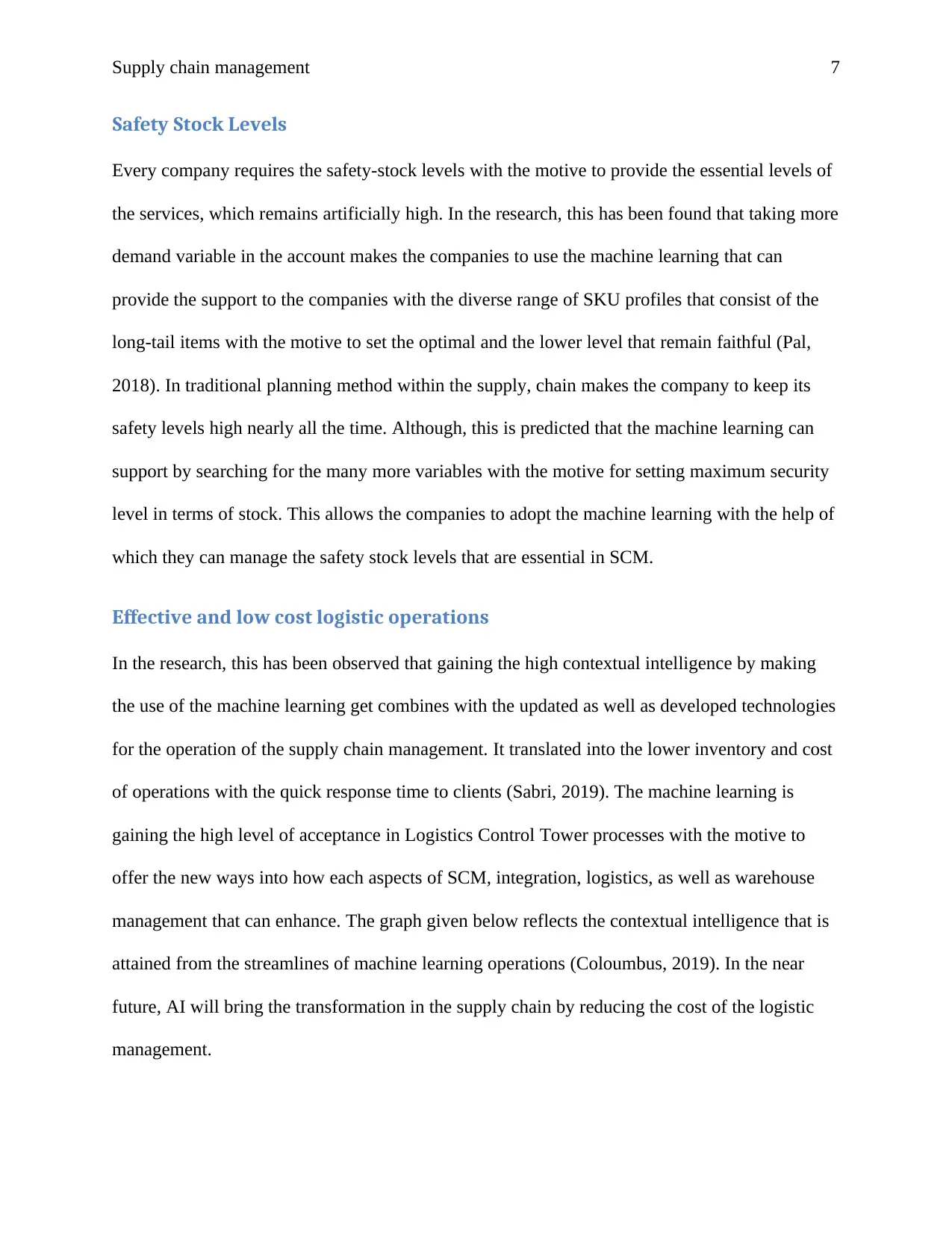
Supply chain management 7
Safety Stock Levels
Every company requires the safety-stock levels with the motive to provide the essential levels of
the services, which remains artificially high. In the research, this has been found that taking more
demand variable in the account makes the companies to use the machine learning that can
provide the support to the companies with the diverse range of SKU profiles that consist of the
long-tail items with the motive to set the optimal and the lower level that remain faithful (Pal,
2018). In traditional planning method within the supply, chain makes the company to keep its
safety levels high nearly all the time. Although, this is predicted that the machine learning can
support by searching for the many more variables with the motive for setting maximum security
level in terms of stock. This allows the companies to adopt the machine learning with the help of
which they can manage the safety stock levels that are essential in SCM.
Effective and low cost logistic operations
In the research, this has been observed that gaining the high contextual intelligence by making
the use of the machine learning get combines with the updated as well as developed technologies
for the operation of the supply chain management. It translated into the lower inventory and cost
of operations with the quick response time to clients (Sabri, 2019). The machine learning is
gaining the high level of acceptance in Logistics Control Tower processes with the motive to
offer the new ways into how each aspects of SCM, integration, logistics, as well as warehouse
management that can enhance. The graph given below reflects the contextual intelligence that is
attained from the streamlines of machine learning operations (Coloumbus, 2019). In the near
future, AI will bring the transformation in the supply chain by reducing the cost of the logistic
management.
Safety Stock Levels
Every company requires the safety-stock levels with the motive to provide the essential levels of
the services, which remains artificially high. In the research, this has been found that taking more
demand variable in the account makes the companies to use the machine learning that can
provide the support to the companies with the diverse range of SKU profiles that consist of the
long-tail items with the motive to set the optimal and the lower level that remain faithful (Pal,
2018). In traditional planning method within the supply, chain makes the company to keep its
safety levels high nearly all the time. Although, this is predicted that the machine learning can
support by searching for the many more variables with the motive for setting maximum security
level in terms of stock. This allows the companies to adopt the machine learning with the help of
which they can manage the safety stock levels that are essential in SCM.
Effective and low cost logistic operations
In the research, this has been observed that gaining the high contextual intelligence by making
the use of the machine learning get combines with the updated as well as developed technologies
for the operation of the supply chain management. It translated into the lower inventory and cost
of operations with the quick response time to clients (Sabri, 2019). The machine learning is
gaining the high level of acceptance in Logistics Control Tower processes with the motive to
offer the new ways into how each aspects of SCM, integration, logistics, as well as warehouse
management that can enhance. The graph given below reflects the contextual intelligence that is
attained from the streamlines of machine learning operations (Coloumbus, 2019). In the near
future, AI will bring the transformation in the supply chain by reducing the cost of the logistic
management.
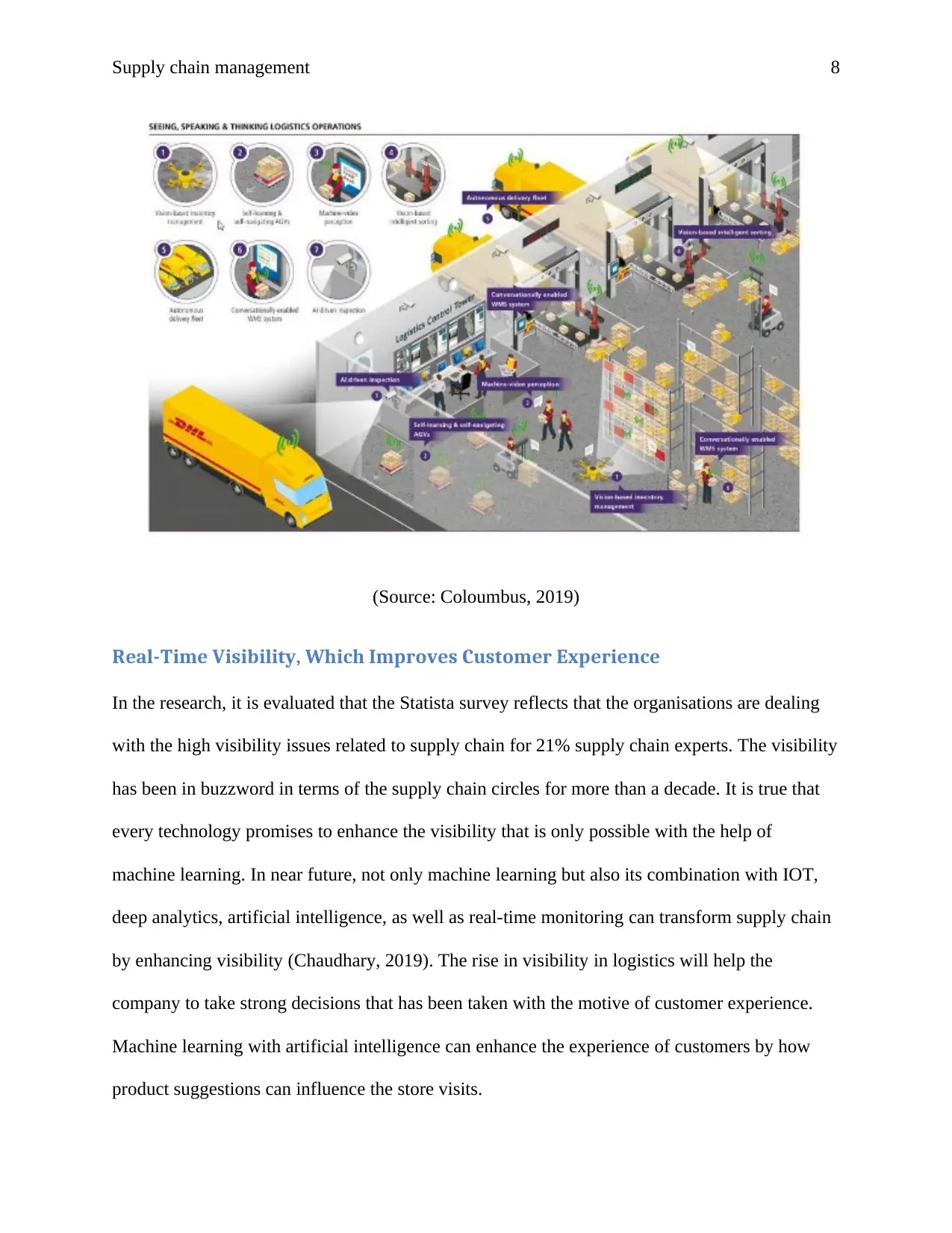
Supply chain management 8
(Source: Coloumbus, 2019)
Real-Time Visibility, Which Improves Customer Experience
In the research, it is evaluated that the Statista survey reflects that the organisations are dealing
with the high visibility issues related to supply chain for 21% supply chain experts. The visibility
has been in buzzword in terms of the supply chain circles for more than a decade. It is true that
every technology promises to enhance the visibility that is only possible with the help of
machine learning. In near future, not only machine learning but also its combination with IOT,
deep analytics, artificial intelligence, as well as real-time monitoring can transform supply chain
by enhancing visibility (Chaudhary, 2019). The rise in visibility in logistics will help the
company to take strong decisions that has been taken with the motive of customer experience.
Machine learning with artificial intelligence can enhance the experience of customers by how
product suggestions can influence the store visits.
(Source: Coloumbus, 2019)
Real-Time Visibility, Which Improves Customer Experience
In the research, it is evaluated that the Statista survey reflects that the organisations are dealing
with the high visibility issues related to supply chain for 21% supply chain experts. The visibility
has been in buzzword in terms of the supply chain circles for more than a decade. It is true that
every technology promises to enhance the visibility that is only possible with the help of
machine learning. In near future, not only machine learning but also its combination with IOT,
deep analytics, artificial intelligence, as well as real-time monitoring can transform supply chain
by enhancing visibility (Chaudhary, 2019). The rise in visibility in logistics will help the
company to take strong decisions that has been taken with the motive of customer experience.
Machine learning with artificial intelligence can enhance the experience of customers by how
product suggestions can influence the store visits.
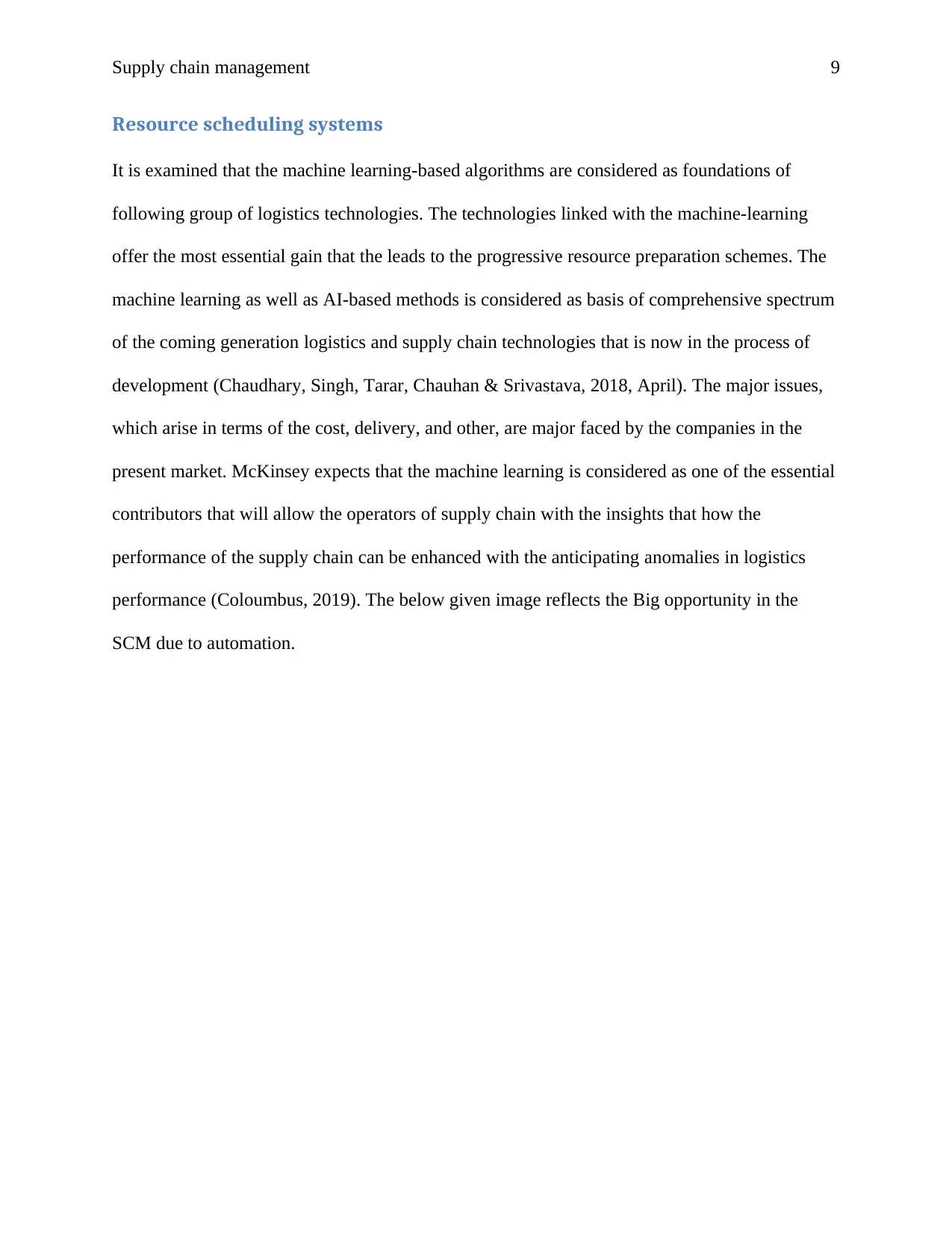
Supply chain management 9
Resource scheduling systems
It is examined that the machine learning-based algorithms are considered as foundations of
following group of logistics technologies. The technologies linked with the machine-learning
offer the most essential gain that the leads to the progressive resource preparation schemes. The
machine learning as well as AI-based methods is considered as basis of comprehensive spectrum
of the coming generation logistics and supply chain technologies that is now in the process of
development (Chaudhary, Singh, Tarar, Chauhan & Srivastava, 2018, April). The major issues,
which arise in terms of the cost, delivery, and other, are major faced by the companies in the
present market. McKinsey expects that the machine learning is considered as one of the essential
contributors that will allow the operators of supply chain with the insights that how the
performance of the supply chain can be enhanced with the anticipating anomalies in logistics
performance (Coloumbus, 2019). The below given image reflects the Big opportunity in the
SCM due to automation.
Resource scheduling systems
It is examined that the machine learning-based algorithms are considered as foundations of
following group of logistics technologies. The technologies linked with the machine-learning
offer the most essential gain that the leads to the progressive resource preparation schemes. The
machine learning as well as AI-based methods is considered as basis of comprehensive spectrum
of the coming generation logistics and supply chain technologies that is now in the process of
development (Chaudhary, Singh, Tarar, Chauhan & Srivastava, 2018, April). The major issues,
which arise in terms of the cost, delivery, and other, are major faced by the companies in the
present market. McKinsey expects that the machine learning is considered as one of the essential
contributors that will allow the operators of supply chain with the insights that how the
performance of the supply chain can be enhanced with the anticipating anomalies in logistics
performance (Coloumbus, 2019). The below given image reflects the Big opportunity in the
SCM due to automation.
Secure Best Marks with AI Grader
Need help grading? Try our AI Grader for instant feedback on your assignments.
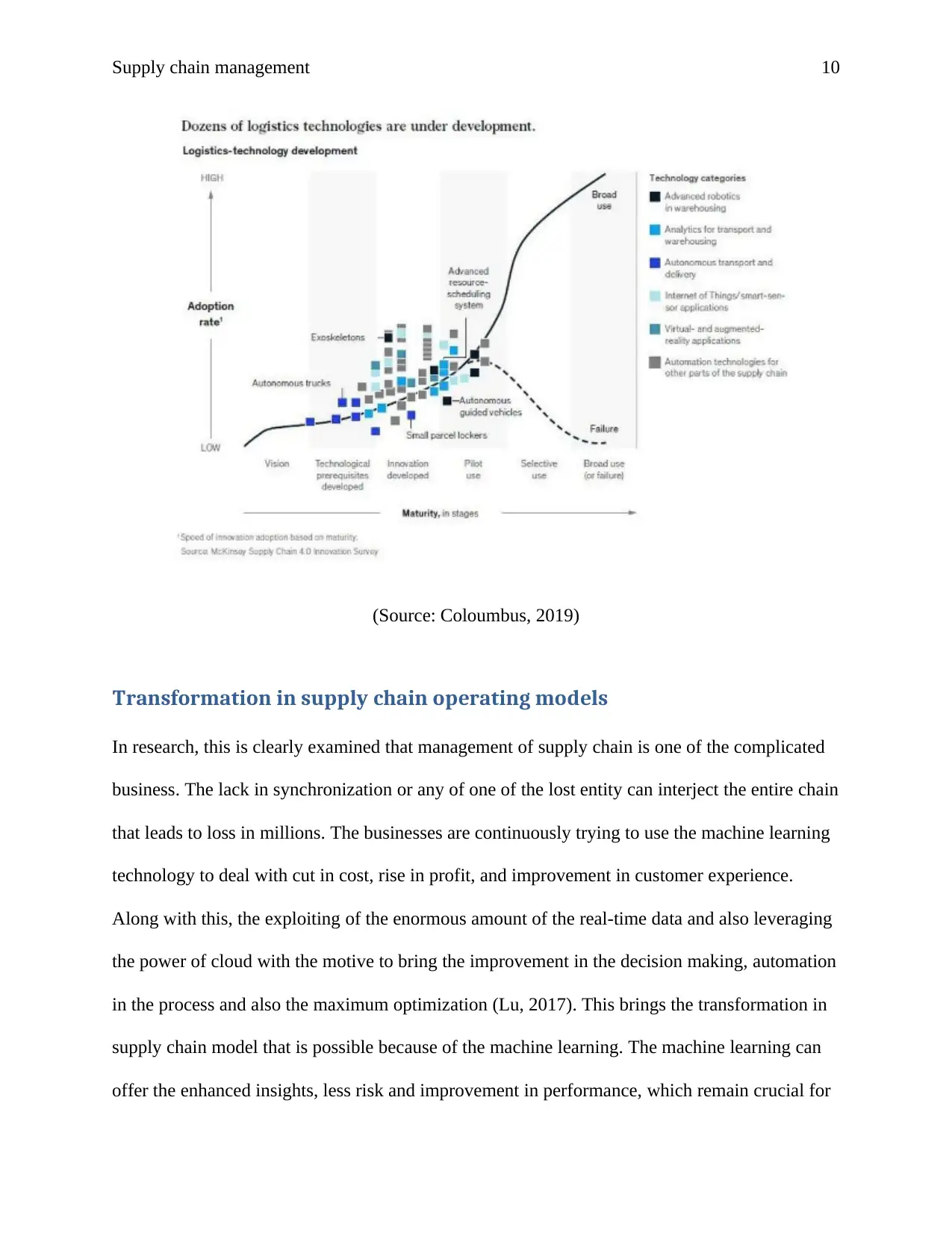
Supply chain management 10
(Source: Coloumbus, 2019)
Transformation in supply chain operating models
In research, this is clearly examined that management of supply chain is one of the complicated
business. The lack in synchronization or any of one of the lost entity can interject the entire chain
that leads to loss in millions. The businesses are continuously trying to use the machine learning
technology to deal with cut in cost, rise in profit, and improvement in customer experience.
Along with this, the exploiting of the enormous amount of the real-time data and also leveraging
the power of cloud with the motive to bring the improvement in the decision making, automation
in the process and also the maximum optimization (Lu, 2017). This brings the transformation in
supply chain model that is possible because of the machine learning. The machine learning can
offer the enhanced insights, less risk and improvement in performance, which remain crucial for
(Source: Coloumbus, 2019)
Transformation in supply chain operating models
In research, this is clearly examined that management of supply chain is one of the complicated
business. The lack in synchronization or any of one of the lost entity can interject the entire chain
that leads to loss in millions. The businesses are continuously trying to use the machine learning
technology to deal with cut in cost, rise in profit, and improvement in customer experience.
Along with this, the exploiting of the enormous amount of the real-time data and also leveraging
the power of cloud with the motive to bring the improvement in the decision making, automation
in the process and also the maximum optimization (Lu, 2017). This brings the transformation in
supply chain model that is possible because of the machine learning. The machine learning can
offer the enhanced insights, less risk and improvement in performance, which remain crucial for
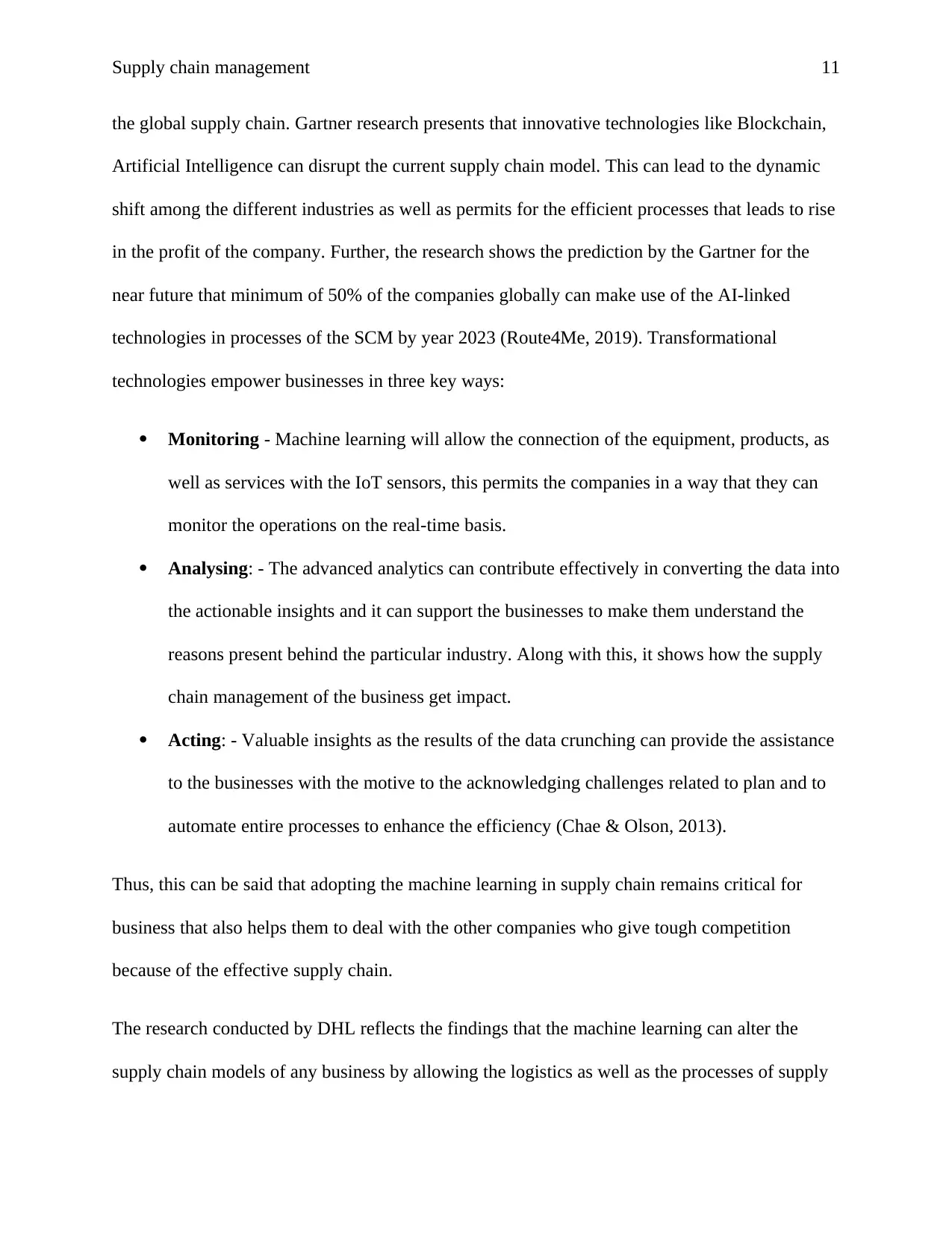
Supply chain management 11
the global supply chain. Gartner research presents that innovative technologies like Blockchain,
Artificial Intelligence can disrupt the current supply chain model. This can lead to the dynamic
shift among the different industries as well as permits for the efficient processes that leads to rise
in the profit of the company. Further, the research shows the prediction by the Gartner for the
near future that minimum of 50% of the companies globally can make use of the AI-linked
technologies in processes of the SCM by year 2023 (Route4Me, 2019). Transformational
technologies empower businesses in three key ways:
Monitoring - Machine learning will allow the connection of the equipment, products, as
well as services with the IoT sensors, this permits the companies in a way that they can
monitor the operations on the real-time basis.
Analysing: - The advanced analytics can contribute effectively in converting the data into
the actionable insights and it can support the businesses to make them understand the
reasons present behind the particular industry. Along with this, it shows how the supply
chain management of the business get impact.
Acting: - Valuable insights as the results of the data crunching can provide the assistance
to the businesses with the motive to the acknowledging challenges related to plan and to
automate entire processes to enhance the efficiency (Chae & Olson, 2013).
Thus, this can be said that adopting the machine learning in supply chain remains critical for
business that also helps them to deal with the other companies who give tough competition
because of the effective supply chain.
The research conducted by DHL reflects the findings that the machine learning can alter the
supply chain models of any business by allowing the logistics as well as the processes of supply
the global supply chain. Gartner research presents that innovative technologies like Blockchain,
Artificial Intelligence can disrupt the current supply chain model. This can lead to the dynamic
shift among the different industries as well as permits for the efficient processes that leads to rise
in the profit of the company. Further, the research shows the prediction by the Gartner for the
near future that minimum of 50% of the companies globally can make use of the AI-linked
technologies in processes of the SCM by year 2023 (Route4Me, 2019). Transformational
technologies empower businesses in three key ways:
Monitoring - Machine learning will allow the connection of the equipment, products, as
well as services with the IoT sensors, this permits the companies in a way that they can
monitor the operations on the real-time basis.
Analysing: - The advanced analytics can contribute effectively in converting the data into
the actionable insights and it can support the businesses to make them understand the
reasons present behind the particular industry. Along with this, it shows how the supply
chain management of the business get impact.
Acting: - Valuable insights as the results of the data crunching can provide the assistance
to the businesses with the motive to the acknowledging challenges related to plan and to
automate entire processes to enhance the efficiency (Chae & Olson, 2013).
Thus, this can be said that adopting the machine learning in supply chain remains critical for
business that also helps them to deal with the other companies who give tough competition
because of the effective supply chain.
The research conducted by DHL reflects the findings that the machine learning can alter the
supply chain models of any business by allowing the logistics as well as the processes of supply
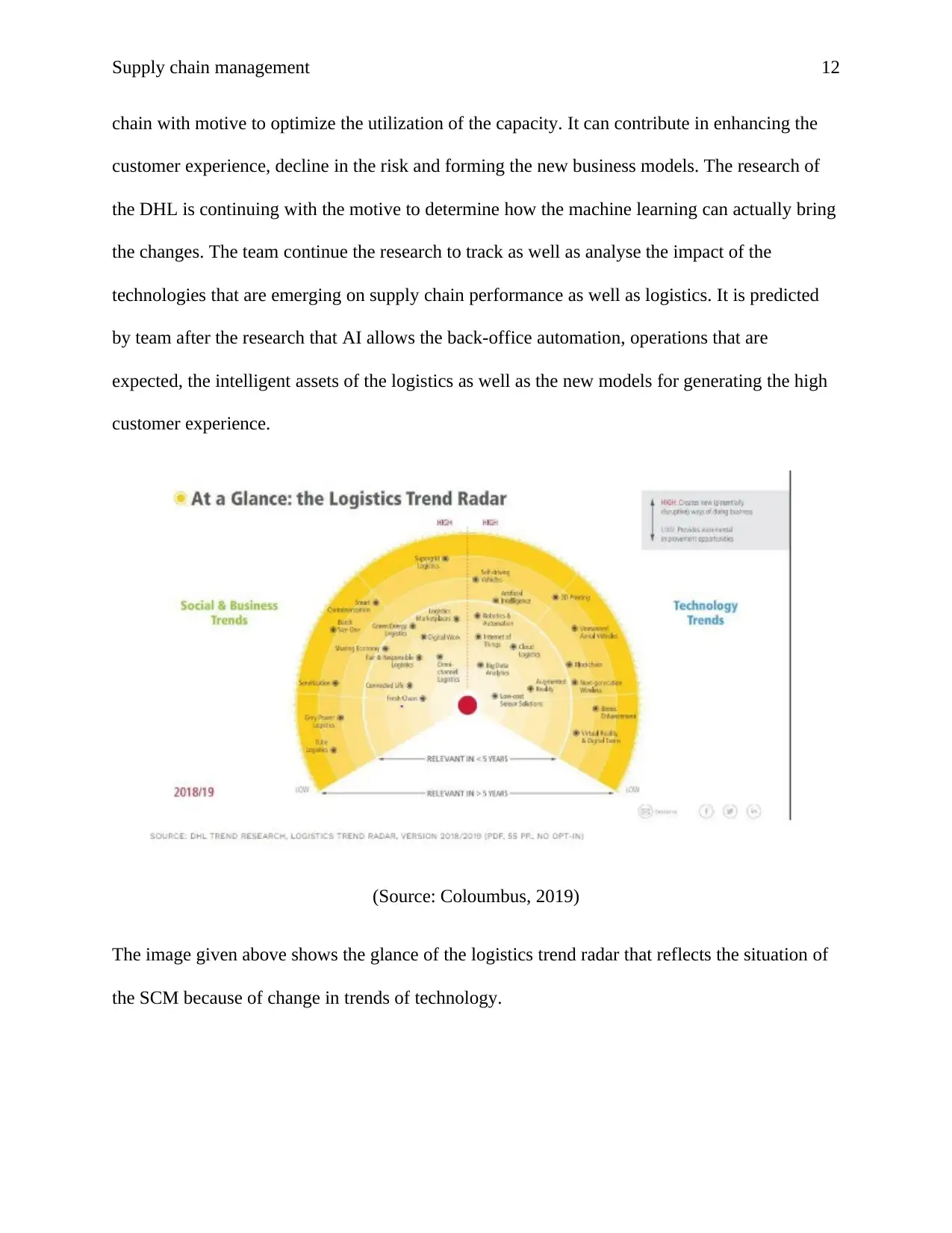
Supply chain management 12
chain with motive to optimize the utilization of the capacity. It can contribute in enhancing the
customer experience, decline in the risk and forming the new business models. The research of
the DHL is continuing with the motive to determine how the machine learning can actually bring
the changes. The team continue the research to track as well as analyse the impact of the
technologies that are emerging on supply chain performance as well as logistics. It is predicted
by team after the research that AI allows the back-office automation, operations that are
expected, the intelligent assets of the logistics as well as the new models for generating the high
customer experience.
(Source: Coloumbus, 2019)
The image given above shows the glance of the logistics trend radar that reflects the situation of
the SCM because of change in trends of technology.
chain with motive to optimize the utilization of the capacity. It can contribute in enhancing the
customer experience, decline in the risk and forming the new business models. The research of
the DHL is continuing with the motive to determine how the machine learning can actually bring
the changes. The team continue the research to track as well as analyse the impact of the
technologies that are emerging on supply chain performance as well as logistics. It is predicted
by team after the research that AI allows the back-office automation, operations that are
expected, the intelligent assets of the logistics as well as the new models for generating the high
customer experience.
(Source: Coloumbus, 2019)
The image given above shows the glance of the logistics trend radar that reflects the situation of
the SCM because of change in trends of technology.
Paraphrase This Document
Need a fresh take? Get an instant paraphrase of this document with our AI Paraphraser
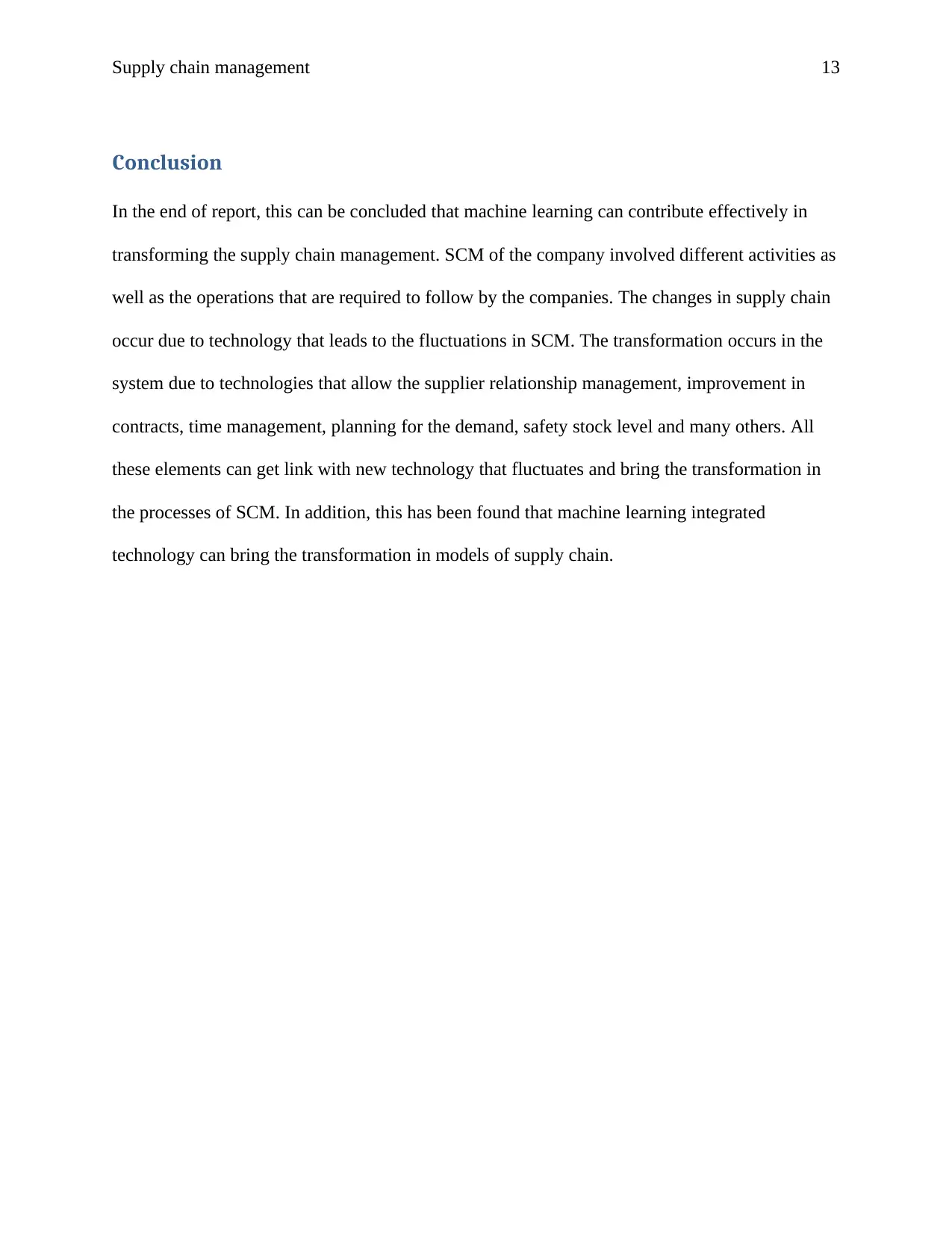
Supply chain management 13
Conclusion
In the end of report, this can be concluded that machine learning can contribute effectively in
transforming the supply chain management. SCM of the company involved different activities as
well as the operations that are required to follow by the companies. The changes in supply chain
occur due to technology that leads to the fluctuations in SCM. The transformation occurs in the
system due to technologies that allow the supplier relationship management, improvement in
contracts, time management, planning for the demand, safety stock level and many others. All
these elements can get link with new technology that fluctuates and bring the transformation in
the processes of SCM. In addition, this has been found that machine learning integrated
technology can bring the transformation in models of supply chain.
Conclusion
In the end of report, this can be concluded that machine learning can contribute effectively in
transforming the supply chain management. SCM of the company involved different activities as
well as the operations that are required to follow by the companies. The changes in supply chain
occur due to technology that leads to the fluctuations in SCM. The transformation occurs in the
system due to technologies that allow the supplier relationship management, improvement in
contracts, time management, planning for the demand, safety stock level and many others. All
these elements can get link with new technology that fluctuates and bring the transformation in
the processes of SCM. In addition, this has been found that machine learning integrated
technology can bring the transformation in models of supply chain.
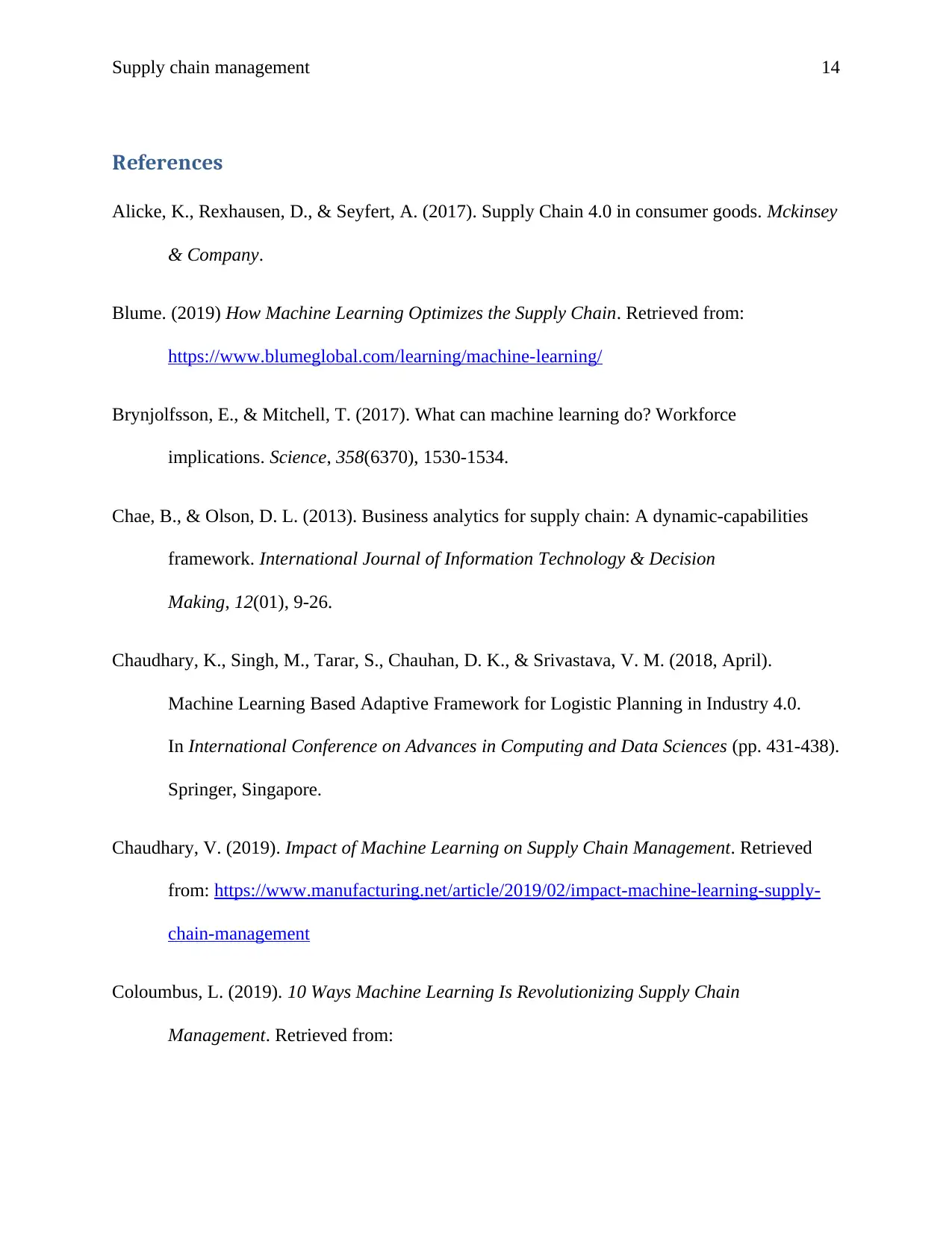
Supply chain management 14
References
Alicke, K., Rexhausen, D., & Seyfert, A. (2017). Supply Chain 4.0 in consumer goods. Mckinsey
& Company.
Blume. (2019) How Machine Learning Optimizes the Supply Chain. Retrieved from:
https://www.blumeglobal.com/learning/machine-learning/
Brynjolfsson, E., & Mitchell, T. (2017). What can machine learning do? Workforce
implications. Science, 358(6370), 1530-1534.
Chae, B., & Olson, D. L. (2013). Business analytics for supply chain: A dynamic-capabilities
framework. International Journal of Information Technology & Decision
Making, 12(01), 9-26.
Chaudhary, K., Singh, M., Tarar, S., Chauhan, D. K., & Srivastava, V. M. (2018, April).
Machine Learning Based Adaptive Framework for Logistic Planning in Industry 4.0.
In International Conference on Advances in Computing and Data Sciences (pp. 431-438).
Springer, Singapore.
Chaudhary, V. (2019). Impact of Machine Learning on Supply Chain Management. Retrieved
from: https://www.manufacturing.net/article/2019/02/impact-machine-learning-supply-
chain-management
Coloumbus, L. (2019). 10 Ways Machine Learning Is Revolutionizing Supply Chain
Management. Retrieved from:
References
Alicke, K., Rexhausen, D., & Seyfert, A. (2017). Supply Chain 4.0 in consumer goods. Mckinsey
& Company.
Blume. (2019) How Machine Learning Optimizes the Supply Chain. Retrieved from:
https://www.blumeglobal.com/learning/machine-learning/
Brynjolfsson, E., & Mitchell, T. (2017). What can machine learning do? Workforce
implications. Science, 358(6370), 1530-1534.
Chae, B., & Olson, D. L. (2013). Business analytics for supply chain: A dynamic-capabilities
framework. International Journal of Information Technology & Decision
Making, 12(01), 9-26.
Chaudhary, K., Singh, M., Tarar, S., Chauhan, D. K., & Srivastava, V. M. (2018, April).
Machine Learning Based Adaptive Framework for Logistic Planning in Industry 4.0.
In International Conference on Advances in Computing and Data Sciences (pp. 431-438).
Springer, Singapore.
Chaudhary, V. (2019). Impact of Machine Learning on Supply Chain Management. Retrieved
from: https://www.manufacturing.net/article/2019/02/impact-machine-learning-supply-
chain-management
Coloumbus, L. (2019). 10 Ways Machine Learning Is Revolutionizing Supply Chain
Management. Retrieved from:
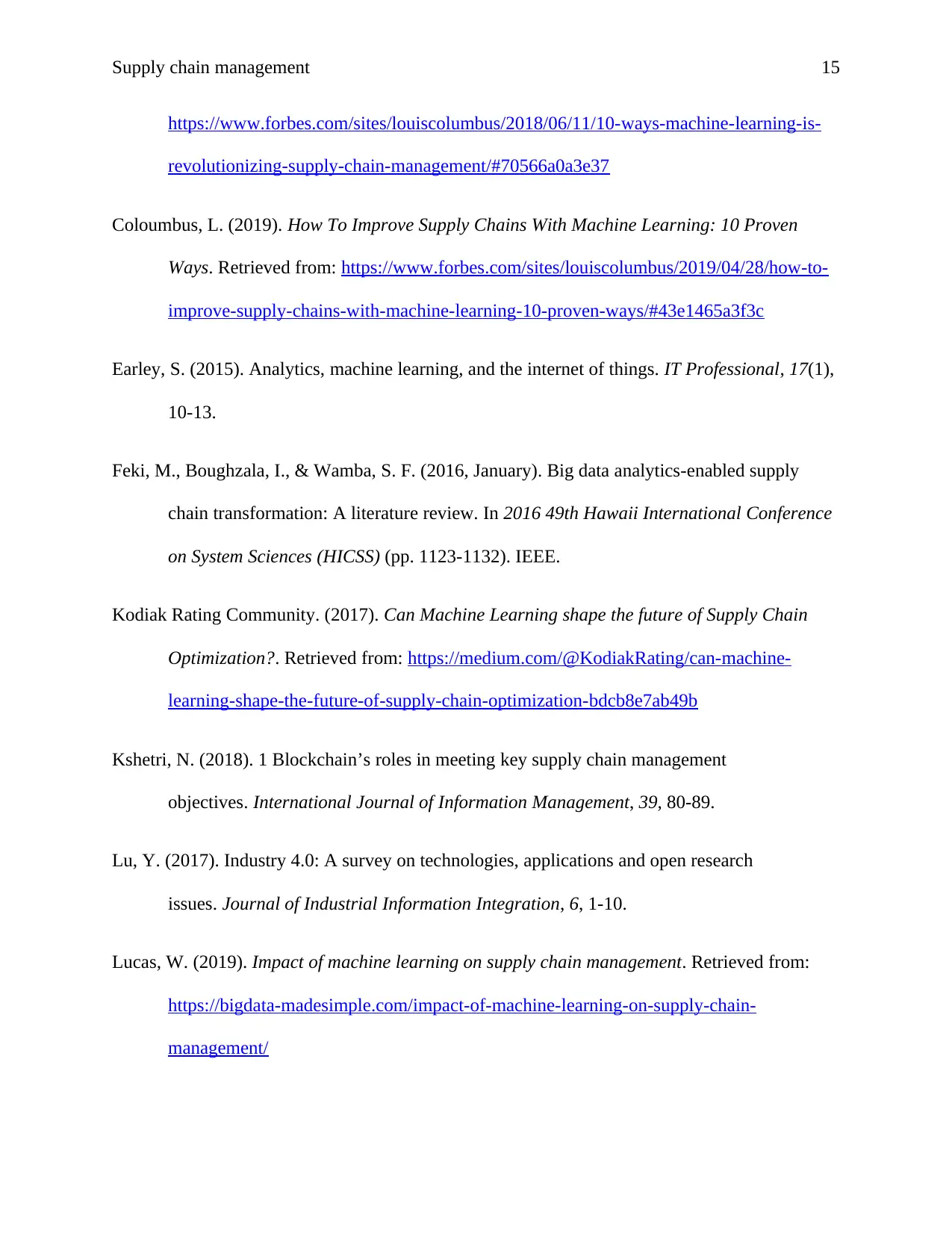
Supply chain management 15
https://www.forbes.com/sites/louiscolumbus/2018/06/11/10-ways-machine-learning-is-
revolutionizing-supply-chain-management/#70566a0a3e37
Coloumbus, L. (2019). How To Improve Supply Chains With Machine Learning: 10 Proven
Ways. Retrieved from: https://www.forbes.com/sites/louiscolumbus/2019/04/28/how-to-
improve-supply-chains-with-machine-learning-10-proven-ways/#43e1465a3f3c
Earley, S. (2015). Analytics, machine learning, and the internet of things. IT Professional, 17(1),
10-13.
Feki, M., Boughzala, I., & Wamba, S. F. (2016, January). Big data analytics-enabled supply
chain transformation: A literature review. In 2016 49th Hawaii International Conference
on System Sciences (HICSS) (pp. 1123-1132). IEEE.
Kodiak Rating Community. (2017). Can Machine Learning shape the future of Supply Chain
Optimization?. Retrieved from: https://medium.com/@KodiakRating/can-machine-
learning-shape-the-future-of-supply-chain-optimization-bdcb8e7ab49b
Kshetri, N. (2018). 1 Blockchain’s roles in meeting key supply chain management
objectives. International Journal of Information Management, 39, 80-89.
Lu, Y. (2017). Industry 4.0: A survey on technologies, applications and open research
issues. Journal of Industrial Information Integration, 6, 1-10.
Lucas, W. (2019). Impact of machine learning on supply chain management. Retrieved from:
https://bigdata-madesimple.com/impact-of-machine-learning-on-supply-chain-
management/
https://www.forbes.com/sites/louiscolumbus/2018/06/11/10-ways-machine-learning-is-
revolutionizing-supply-chain-management/#70566a0a3e37
Coloumbus, L. (2019). How To Improve Supply Chains With Machine Learning: 10 Proven
Ways. Retrieved from: https://www.forbes.com/sites/louiscolumbus/2019/04/28/how-to-
improve-supply-chains-with-machine-learning-10-proven-ways/#43e1465a3f3c
Earley, S. (2015). Analytics, machine learning, and the internet of things. IT Professional, 17(1),
10-13.
Feki, M., Boughzala, I., & Wamba, S. F. (2016, January). Big data analytics-enabled supply
chain transformation: A literature review. In 2016 49th Hawaii International Conference
on System Sciences (HICSS) (pp. 1123-1132). IEEE.
Kodiak Rating Community. (2017). Can Machine Learning shape the future of Supply Chain
Optimization?. Retrieved from: https://medium.com/@KodiakRating/can-machine-
learning-shape-the-future-of-supply-chain-optimization-bdcb8e7ab49b
Kshetri, N. (2018). 1 Blockchain’s roles in meeting key supply chain management
objectives. International Journal of Information Management, 39, 80-89.
Lu, Y. (2017). Industry 4.0: A survey on technologies, applications and open research
issues. Journal of Industrial Information Integration, 6, 1-10.
Lucas, W. (2019). Impact of machine learning on supply chain management. Retrieved from:
https://bigdata-madesimple.com/impact-of-machine-learning-on-supply-chain-
management/
Secure Best Marks with AI Grader
Need help grading? Try our AI Grader for instant feedback on your assignments.
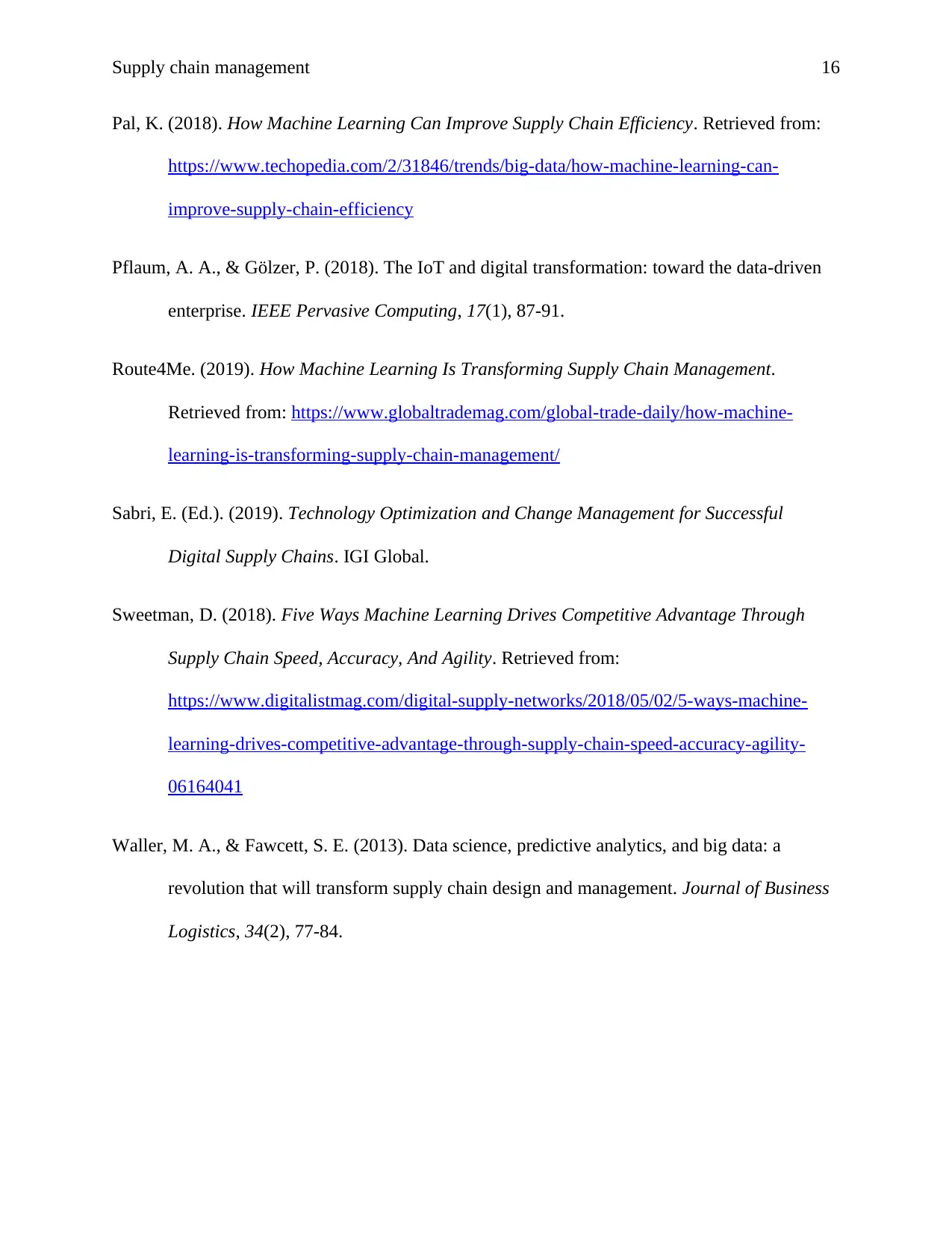
Supply chain management 16
Pal, K. (2018). How Machine Learning Can Improve Supply Chain Efficiency. Retrieved from:
https://www.techopedia.com/2/31846/trends/big-data/how-machine-learning-can-
improve-supply-chain-efficiency
Pflaum, A. A., & Gölzer, P. (2018). The IoT and digital transformation: toward the data-driven
enterprise. IEEE Pervasive Computing, 17(1), 87-91.
Route4Me. (2019). How Machine Learning Is Transforming Supply Chain Management.
Retrieved from: https://www.globaltrademag.com/global-trade-daily/how-machine-
learning-is-transforming-supply-chain-management/
Sabri, E. (Ed.). (2019). Technology Optimization and Change Management for Successful
Digital Supply Chains. IGI Global.
Sweetman, D. (2018). Five Ways Machine Learning Drives Competitive Advantage Through
Supply Chain Speed, Accuracy, And Agility. Retrieved from:
https://www.digitalistmag.com/digital-supply-networks/2018/05/02/5-ways-machine-
learning-drives-competitive-advantage-through-supply-chain-speed-accuracy-agility-
06164041
Waller, M. A., & Fawcett, S. E. (2013). Data science, predictive analytics, and big data: a
revolution that will transform supply chain design and management. Journal of Business
Logistics, 34(2), 77-84.
Pal, K. (2018). How Machine Learning Can Improve Supply Chain Efficiency. Retrieved from:
https://www.techopedia.com/2/31846/trends/big-data/how-machine-learning-can-
improve-supply-chain-efficiency
Pflaum, A. A., & Gölzer, P. (2018). The IoT and digital transformation: toward the data-driven
enterprise. IEEE Pervasive Computing, 17(1), 87-91.
Route4Me. (2019). How Machine Learning Is Transforming Supply Chain Management.
Retrieved from: https://www.globaltrademag.com/global-trade-daily/how-machine-
learning-is-transforming-supply-chain-management/
Sabri, E. (Ed.). (2019). Technology Optimization and Change Management for Successful
Digital Supply Chains. IGI Global.
Sweetman, D. (2018). Five Ways Machine Learning Drives Competitive Advantage Through
Supply Chain Speed, Accuracy, And Agility. Retrieved from:
https://www.digitalistmag.com/digital-supply-networks/2018/05/02/5-ways-machine-
learning-drives-competitive-advantage-through-supply-chain-speed-accuracy-agility-
06164041
Waller, M. A., & Fawcett, S. E. (2013). Data science, predictive analytics, and big data: a
revolution that will transform supply chain design and management. Journal of Business
Logistics, 34(2), 77-84.
1 out of 17
Related Documents
Your All-in-One AI-Powered Toolkit for Academic Success.
+13062052269
info@desklib.com
Available 24*7 on WhatsApp / Email
![[object Object]](/_next/static/media/star-bottom.7253800d.svg)
Unlock your academic potential
© 2024 | Zucol Services PVT LTD | All rights reserved.





